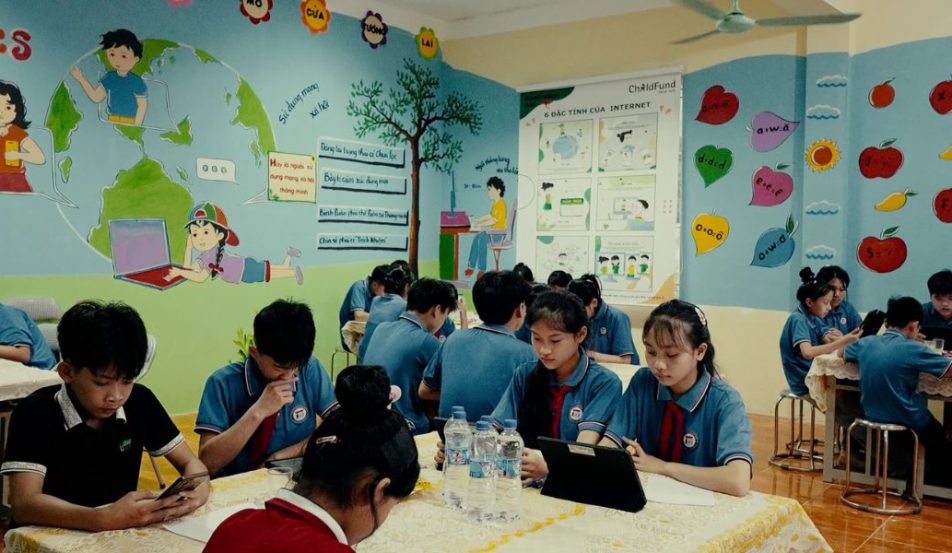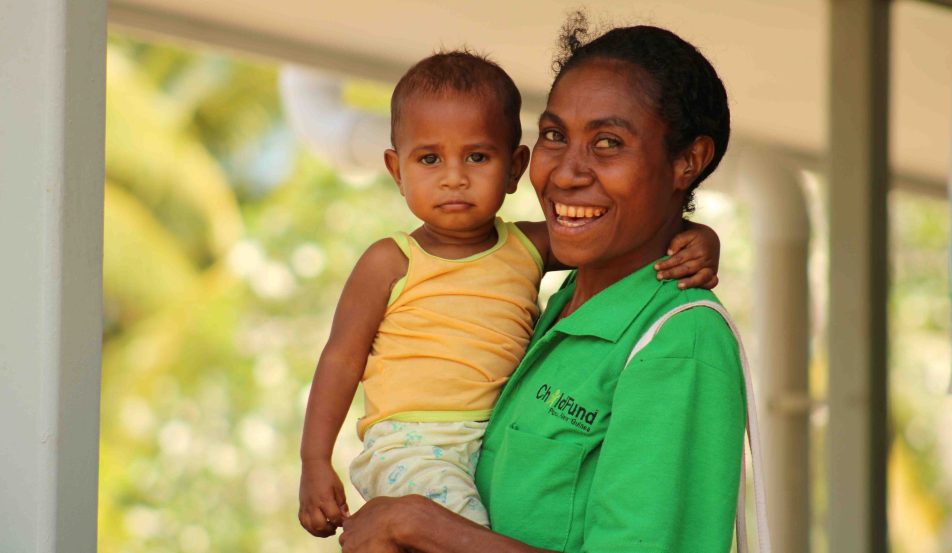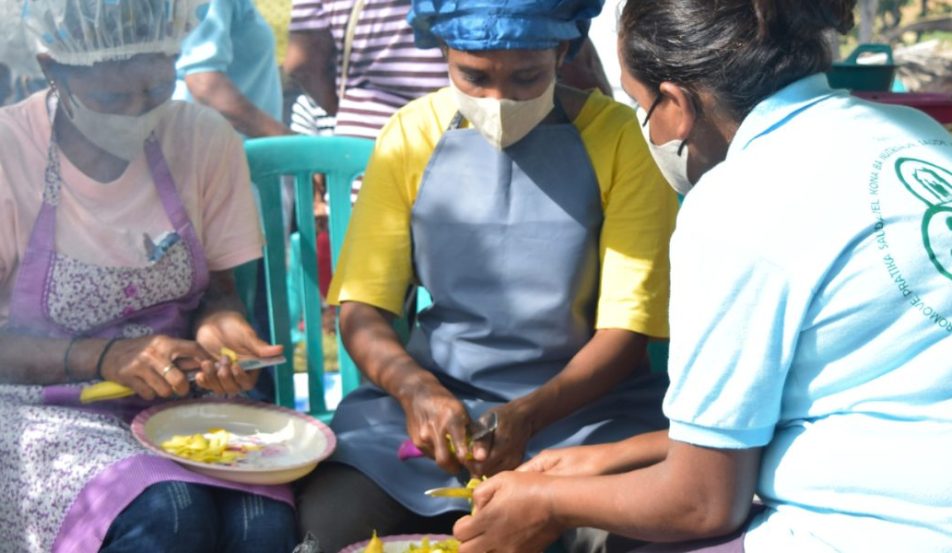Rugby Solidarity in the Aftermath: How an All-women Rugby Crew Became Typhoon Responders
At the end of 2021, a Category 5 typhoon hit the Philippine archipelago, leaving hundreds dead, 1.7 million houses damaged or destroyed, and severely affecting up to 9.9 million people. During the aftermath, an all-women crew of ChildFund Sport for Development rugby coaches and supporters came together to respond to the needs of those who were most impacted by the typhoon.
On the night of 16 December, Angel Gelisanga crouched in the dark with her family at their home in Talisay, a city north of Negros island in the Philippines. They listened as the winds roared violently, threatening to rip off their roof. They were in the path of the strongest typhoon to hit the country in 2021.
“Water started coming into our home, then the electricity went out. All we could hear were the sounds of the wind, and objects being blown away,” said Angel, a former Pass it Back coach and a member of the Negros Island Rugby club. “We wanted to check in with our neighbours to know if they were all right, but there was no way to reach them. The phone signal was out.”
Typhoon Rai (locally known as Odette) pummelled the country, bringing with it torrential rains, landslides, storm surges, and winds of up to 195 km/h. The typhoon went from category one to five in a single day, giving people little to no time to prepare.
“We didn’t know that the typhoon was going to be that strong,” Angel recalled. “We were so scared that we didn’t get to sleep that night. It was impossible.”
The next day, they saw the destruction the typhoon left behind. Houses were decimated, trees uprooted and electricity posts toppled. The typhoon wrought havoc in five other provinces in the Visayas region, as well as in the provinces of Surigao del Norte and Dinagat Islands in Mindanao, and in the island of Palawan in Luzon. An estimated 9.9 million people were severely affected.
Apart from the destruction, the typhoon also left survivors seeking clean drinking water. According to Angel, the supply station in their area could only provide two jugs per household. Without electricity, the supplier couldn’t produce more drinking water. Then, there was a panic to get food.
“My family was able to stock up on food, but there were people worried about food supplies running out, so hoards of people went to the stores and then panic buying ensued,” said Angel.
“I consider my family lucky because we weren’t hit as hard as other families, and we had enough food,” Angel added. “But being cut off from the rest of the country because phone signals were out was worrisome. Do people outside our island know about the situation here? Will the people here be able to get help?”
The chat message that sparked the typhoon response
Miles away from the typhoon-affected region, the phones of Philippine Rugby Football Union’s (PRFU) members and its networks began ringing. In a WhatsApp group chat, PRFU Rugby Development Manager Angella “Acee” Camille San Juan, and Administration Head Lorie Baclagon, are checking in on each other and other union members.
“We were worried because we had clubs, players, and Development Officers in the affected areas. What was even more worrisome was we could not get in touch with them because the phone lines there got cut off,” said Lorie. “Our boss Jake [Letts, PRFU CEO] said we should do something for our rugby family affected by the typhoon.”
Then the photos of the aftermath of the typhoon started coming in. Back in Negros, Angel found an area where she could get a phone signal and then she started sending the photos to the group chat.
“Right then and there, the women in the group decided that it was time to start a fundraising campaign,” said Lorie. “We started putting together posters and uploaded them on our social media channels.”
The ChildFund Rugby team were among those who saw the call for help and immediately got in touch with Acee.
“We were so happy when ChildFund Rugby called and said they have funds available for relief operations,” said Lorie.
With donations coming in, it was time to get to work.
Rugby solidarity in the aftermath
“It was impressive to witness PRFU’s agility to use their sports networks to effectively deliver humanitarian support, which is important especially for a country that gets visited by at least 20 typhoons a year. And ChildFund Rugby was proud to be able to support,” said Thu Le, Asia Program Coordinator for ChildFund Rugby.
Organising a typhoon response amidst a pandemic and a Christmas break — when banks and many of the suppliers’ stores were closed — was no easy feat.
“We came across so many roadblocks, initially,” Lorie said. “First, we couldn’t easily get access to the funds. Because of the holiday break, financial books were closed. And then, Acee and I got sick with COVID-19. But we had to keep pushing because people in the affected region needed support.”
Lorie and Acee coordinated remotely with Angel and while waiting to get access to funds, they spent their time planning, scouting for suppliers, and assessing the needs on the ground.
In Negros, Angel started rallying her all-woman coach team who would help her prepare hundreds of aid packages, get trucks to transport them, and then eventually deliver them to each household.
Angel and her team focussed on households that were hit the hardest, as well as households that may not be easily reached by humanitarian responders. This meant traversing rough and sometimes dangerous terrain.
There are families living in the mountains, and since they are in hard-to-reach areas, they often receive aid last, and the least,” said Angel. “We had to prioritise them, even if it meant travelling up to three hours up the mountains.”
Meanwhile in the province of Cebu, Rugby Development Officers Maggie Royo and Madille Salinas were also closely coordinating with Lorie and Acee. The two women were typhoon survivors themselves but, like Angel, they were compelled to put boots on the ground to respond to the needs of the rugby community in Cebu affected by the typhoon.
As a result of all the women’s hard work — in Negros, Cebu, and in the country’s capital — 500 families in need of aid received the packages.
“It was one big rugby family applying rugby and Filipino values of passion, compassion, and solidarity,” said Angel.
“For Angel, it was also the rugby value of integrity,” Lorie added. “From Negros, she had to manage a large amount of money, account for every centavo spent, and make sure that all of the funds went to the needs of the families affected.”
The efforts of PRFU and its rugby networks displayed how sports clubs, bodies, and unions are no longer only sports-focussed institutions, but organisations with social responsibilities. Aside from playing an active role in advancing women’s leadership in their communities, training youth leaders, and recently, responding to the challenges faced by young people resulting from COVID-19, in this case they also responded to the needs of people affected by a crisis.
“We have seen that sport can not only be a powerful vehicle for change in communities, the networks that build up around sport, can be activated in times of crisis” said ChildFund Rugby Director, Chris Mastaglio. “Hopefully, in a world impacted by climate change, support can be made available for sports and their networks to be ready to support communities in times of crisis.”
Notes:
Philippines Rugby Football Union
The PRFU is the official governing body of the sport of Rugby Union in the Philippines. The PRFU was founded in 1998 and was granted full World Rugby membership in 2008. Philippine Rugby is a non-profit national sports association registered with SEC focused on growing and developing the sport of Rugby Union in the Philippines. The PRFU board consists of seven board members and a full time staff of four full time employees and consultants along with a number of regional Development Officers/Coaches located all over the country. The PRFU and its Development Officers provide free training in contact rugby for schools, institutions, clubs and local foundations.
The PRFU are registered accredited members of both World Rugby and Asia Rugby as well as being recognised by the Philippine Olympic Committee and Philippine Sports Commission.
ChildFund Rugby
ChildFund Rugby’s partnerships provide children and young people with opportunities to play, learn, and lead.
Through integrated rugby and life skills learning, young people from vulnerable communities are equipped to overcome challenges, inspire positive social change, and take active leadership roles within their communities.
All partnerships contribute to building an equitable and inclusive future, where children are safe from violence — reflecting targets within the UN Sustainable Development Goals.
ChildFund Rugby is led by ChildFund Australia, an independent international development organisation that works to reduce poverty for children in developing communities and a member of the ChildFund Alliance – a global network of 12 organisations which assists almost 23 million children and their families in 70 countries.

































